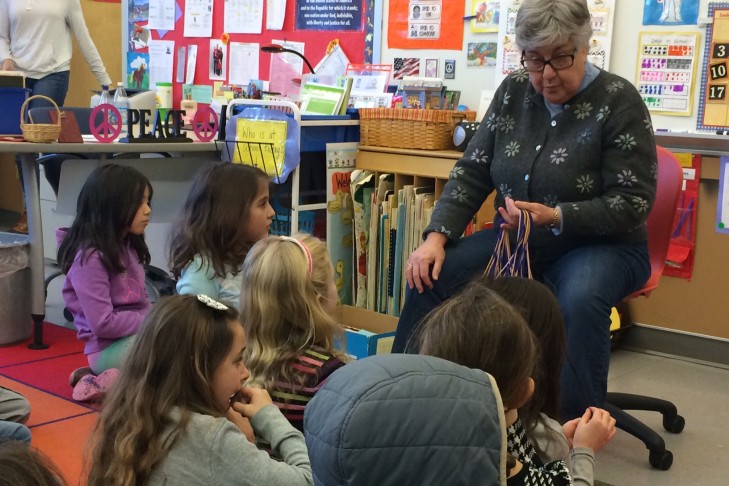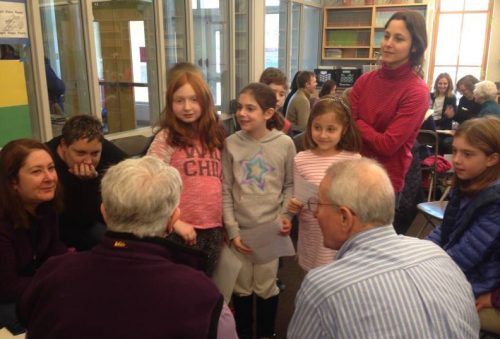“What was it like getting support when your wife was sick?” asks Isaac, a wide-eyed and serious fourth grader at the Temple Shir Tikvah religious school in Winchester, Massachusetts.
“People dropped off meals in a cooler on our porch,” explains Barry, a longtime temple member. “It was like manna from heaven! Instead of spending time shopping and cooking, I had precious time with my wife.”
Barry Kahn, 63, a member of Temple Shir Tikvah, lost his wife, Sandy, to cancer a few years ago. In the months before her death, the temple’s Caring Committee coordinated members to cook and deliver meals to their home. Barry is at the religious school this Sunday morning to be interviewed by the fourth graders because he hopes the children and their parents will learn from his firsthand experience of being a recipient of gemilut chasadim, acts of lovingkindness. Also being interviewed this morning are adult temple members who volunteer for the Caring Committee, offering the children a chance to understand the Jewish practices of supporting one another at times of need.
Temple Shir Tikvah’s innovative educational model, the Learning Corps, grew out of a desire to create a meaningful link between the school and other aspects of the congregation and to inspire parents of school-age children to take an active part in the temple. The Learning Corps pairs each grade with a different temple committee as a way for learners – both children and adults – to make an authentic contribution to the temple community. This model provides opportunities to strengthen ties between the congregation and the religious school. Families are involved in some aspects of the learning, participating in the ongoing work of the synagogue committees. For example, families work with the Caring Committee by helping at a shiva home (children are included in visits to the home of mourners.) Other families work with the Tikkun Olam Committee by volunteering to cook and serve dinner at a soup kitchen. Committees for Community Engagement, Israel, Caring, Ritual and Tikkun Olam directly collaborate with the classes, and all temple planning takes the Learning Corps vision into consideration when setting goals.
Temple Shir Tikvah has, from its inception, put relationships and community building at the forefront. The Learning Corps has integrated this commitment through an intentional use of story-based pedagogies. Stories are used to introduce themes, to learn content and to reflect on learning. Interviewing and the sharing of personal stories affords everyone involved an opportunity for genuine, face-to-face connection. This approach taps adults who might not otherwise meet young families, who are honored to share their wisdom and life experiences. Members are invited to talk about being a founding temple member, time spent living or traveling in Israel, receiving help or support from the congregation at a time of illness or loss, personal prayer practices or experience of spirituality, and social justice work. Facilitated personal story sharing along with hands on projects help school families understand the deep underpinnings of Jewish values that motivate the important work of a temple community. Laura Sternberger, the parent of a 4th grader shared: “The intergenerational programming has created deep, palpable shifts in our culture. I’m thrilled that my family has this opportunity to learn about Jewish values in such a meaningful way.”
The present model, which is now school-wide, was built over a period of five years–what started as a small pilot in 4th and 5th grades grew to significantly influence congregational culture and practice. In the project’s early stages, Education Director Bailee Star attended meetings of the committees she hoped to engage in the Learning Corps. She encouraged committee members to visit school classes to explain the work of the committee and to tell stories of their personal experiences. The Learning Corps is now an official item on the meeting agendas of the affiliated committees and questions about how to connect learners to projects are considered at the meetings of all temple committees.
The impact has been felt in many ways and throughout the Shir Tikvah community, for example:
- Leadership: A new leadership group, comprised of teachers, parents, committee members, clergy, and members of the board (a Trustee for Learning Corps was designated this year), was formed to ensure sustainability, collaboration, reflection and growth. Cross-fertilization between the leadership group, teachers and committees allows us to develop new and interesting projects such as an “Israel Day” sponsored by the Israel Corps, and “Havdalah Together” sponsored by the Community Engagement Corps. All five committees have welcomed at least two new parents as members over the course of the last two years as a result of their Learning Corps involvement.
- Adult education: Classes are now free and held concurrent to religious school on Sunday mornings. Families gather in the lobby together with members of the wider temple community for coffee and bagels. Learning then starts for both children and adults. The drop-off model has been replaced by whole family learning–either parallel learning or kids and parents together as a group.
- Participation: Committee members, older congregants who want to share their stories, board members, clergy and staff are actively engaged in the Learning Corps. Intergenerational groups are responsible for designing, planning and implementing community-wide events that invite all ages and stages to participate. The annual meeting, formerly under attended, now coincides with the last day of religious school to encourage parent involvement.
- Communications: The new temple website, the newsletter, and promotional materials feature stories about the impact of the Learning Corps.
As member Barry Kahn told us, “Some kids and their parents came up to me at Shabbat services and said how much it meant to them that I had shared my story. It helped me remember my gratitude for this community and made me want to stay involved in the temple.”
Bailee Star is the Education Director at Temple Shir Tikvah in Winchester.
Cindy Rivka Marshall is a CJP Consultant with Jewish Learning Connections and a storyteller. She blogs about the use of story-based approaches in the Learning Corps.
This is the third in a series of blog posts from Jewish Learning Connections. Read the first two posts here and here.
This post has been contributed by a third party. The opinions, facts and any media content are presented solely by the author, and JewishBoston assumes no responsibility for them. Want to add your voice to the conversation? Publish your own post here. MORE


